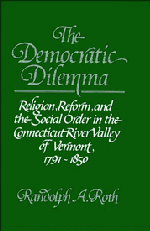 The Democratic Dilemma
The Democratic Dilemma Book contents
- Frontmatter
- Contents
- List of tables and maps
- Acknowledgments
- Introduction
- 1 The revolutionary frontier, 1763–1800
- 2 The failure of the covenanted community and the standing order, 1791–1815
- 3 Religion and reform in the shaping of a new order, 1815–1828
- 4 From an era of promise to pressing times, 1815–1843
- 5 A clamor for reform, 1828–1835
- 6 The great revival, 1827–1843
- 7 A modified order in town life and politics, 1835–1850
- 8 Boosterism, sentiment, free soil, and the preservation of a Christian, reformed republic
- Conclusion: Religion, reform, and the problem of order in the Age of Democratic Revolution
- Appendix A Church records
- Appendix B Types of towns
- Appendix C Occupational groups
- Appendix D Statistical methods
- Notes
- Index
8 - Boosterism, sentiment, free soil, and the preservation of a Christian, reformed republic
Published online by Cambridge University Press: 04 August 2010
- Frontmatter
- Contents
- List of tables and maps
- Acknowledgments
- Introduction
- 1 The revolutionary frontier, 1763–1800
- 2 The failure of the covenanted community and the standing order, 1791–1815
- 3 Religion and reform in the shaping of a new order, 1815–1828
- 4 From an era of promise to pressing times, 1815–1843
- 5 A clamor for reform, 1828–1835
- 6 The great revival, 1827–1843
- 7 A modified order in town life and politics, 1835–1850
- 8 Boosterism, sentiment, free soil, and the preservation of a Christian, reformed republic
- Conclusion: Religion, reform, and the problem of order in the Age of Democratic Revolution
- Appendix A Church records
- Appendix B Types of towns
- Appendix C Occupational groups
- Appendix D Statistical methods
- Notes
- Index
Summary
The modified order in town life and politics addressed the concerns of the valley's inhabitants in concrete ways, but it failed to restore the sense of purpose, the prestige, and the influence that were theirs when they stood as revolutionary frontiersmen in the vanguard of civilization. The valley remained incapable of providing sufficient opportunities for its inhabitants. Because of the disappointments of the revival, the churches had lost their early vigor, and the political parties proved unable to defend the valley's interests in national debates on the economy and the western territories, upon whose outcome the valley's fate seemed increasingly to depend. Its citizens were fated to be searching still for solutions to their problems at midcentury. Yet few Vermonters surrendered their dreams of economic independence and prosperity, and despite the failure of the modified order to recapture the social harmony and unity of purpose that characterized the 1820s, most of them believed that the new spirit of boosterism, the awakening of sentimental piety, and the campaign for free soil could reconcile the valley's divided inhabitants and revive their dedication to a Christian, reformed republic.
Economy and society
Charles Merrifield, editor of the Vermont Journal, complained in an editorial in 1844 that a “mental sleep” had enveloped the once bustling town of Windsor and that the town was in danger of becoming one of those places that time forgot.
- Type
- Chapter
- Information
- The Democratic DilemmaReligion, Reform, and the Social Order in the Connecticut River Valley of Vermont, 1791–1850, pp. 265 - 298Publisher: Cambridge University PressPrint publication year: 1987


